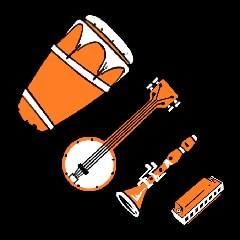
After 22 minutes have passed in the game, the sun goes supernova in a massive explosion that ends all life. You see, the universe of Outer Wilds is ending. Outer Wilds can feel very lonely, especially as the game’s somber narrative slowly reveals itself, and this allows the music of the Travelers to be known by the player as a small comfort in the face of their gargantuan task. When traversing the various planets or the empty void, there is often only the hum of your ship or the sounds of the nearby environment to accompany you. When spacewalking you will regularly hear nothing but the sound of your own breathing. Smartly, the music also knows when not to play, which is perhaps a majority of the time.

Given that the Nomai were considerably more technologically advanced than the Hearthians, and that not much is known about them, the droning synths feel appropriately out of place when compared to the rest of the score. Sparse passages of piano and some quiet but often menacing synths are used at key moments of exploration in space and in the ruins of a long extinct race of aliens called the Nomai. Not all of the music is diegetic, however. These disparate signals of banjo and percussion, in addition to the aforementioned flute and whistling, combine to create a folksy song that fits perfectly to the character of the Hearthians. The treat comes when the player mistakenly receives multiple of the Travelers’ signals at once, revealing that they are actually playing different parts of the same song.
:no_upscale()/cdn.vox-cdn.com/uploads/chorus_asset/file/19430366/Outer_Wilds_Dark_Bramble_1.jpg)
Or Gabbro, another Traveler whose laidback nature and flute melody sounds out of place amidst the chaos of the raging seas and storms of the planet called Giant’s Deep, which they have chosen for their base camp. For instance, the Hearthian Esker lives on Timber Hearth’s moon and whistles to themselves to pass the time. Just point the signalscope in a direction and listen for a tune. The Hearthians have an apparent love for music and this, when combined with the signalscope, makes them easy to locate amidst the vastness of space. In this case, it allows you to locate the other Travelers by their instruments. Enter the signalscope - an ingenious device that allows you to listen to distant audio signals and serves as a useful tool throughout the entire game. The past members of the Ventures, called Travelers, are still out in the solar system poking around, and it is recommended that you chat with them to get the lay of the land. It is incredibly charming and illustrates how out of depth the Hearthians are when it comes to understanding the vastness of their universe. It appears to be made of 60 percent wood and under no circumstances would it function in real life. Your ship, for instance, feels like a hacked together iteration of an almost entirely terrible idea. The game establishes a lot of history about the foundation of the space program, which I will skip for the sake of brevity, but it does an excellent job at characterising the Hearthians as lovable and curious people whose technology is a bit too rudimentary for their ambitions. The Hearthian community is small and tightly knit through their single-minded appreciation for the simple life of honest work and campfires under the night sky. The planet is small and idyllic with a temperate climate and an abundance of trees, grass, and flowing water. They have always lived on the planet of Timber Hearth and seem just like simple folk livin’ off the land. From a brief jaunt through your hometown (which also serves as the game’s tutorial) you are introduced rather succinctly to the culture of your people, the Hearthians. You play as the newest astronaut of your race’s long-running space program, named The Outer Wilds Ventures.
:no_upscale()/cdn.vox-cdn.com/uploads/chorus_asset/file/18321974/Outer_Wilds_The_Attlerock__0003_Layer_2.jpg)
I definitely recommend playing the game before reading on because I will be spoiling some things. There are a great many very excellent soundtracks out there, but Outer Wilds’ dedication to including its music into its world, narrative and themes feels especially noteworthy. Very rarely do games and their music integrate much beyond a game simply having music. I have never played anything like it before and that praise extends into the game’s usage of its soundtrack. Outer Wilds does a lot of things very well.


 0 kommentar(er)
0 kommentar(er)
